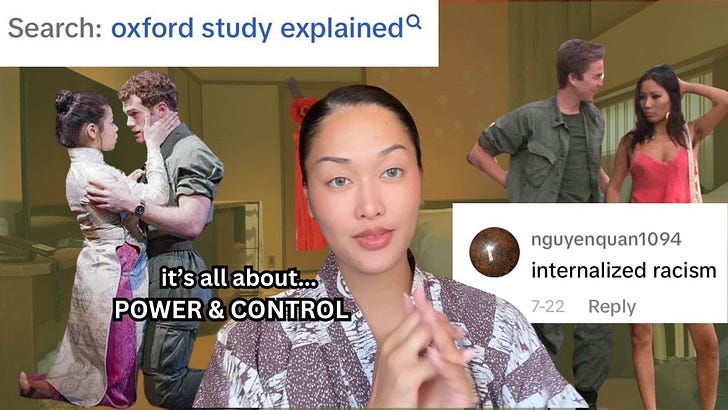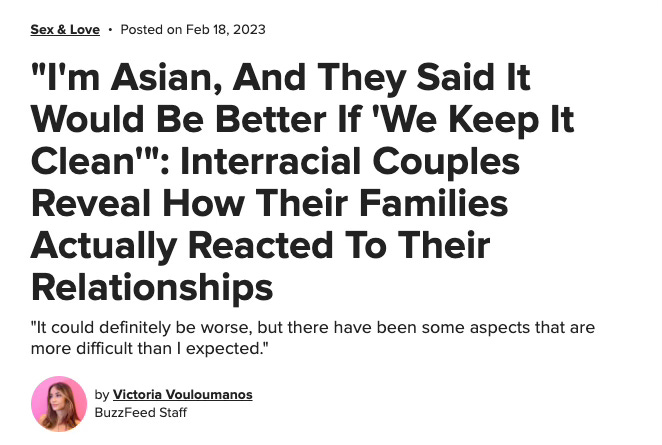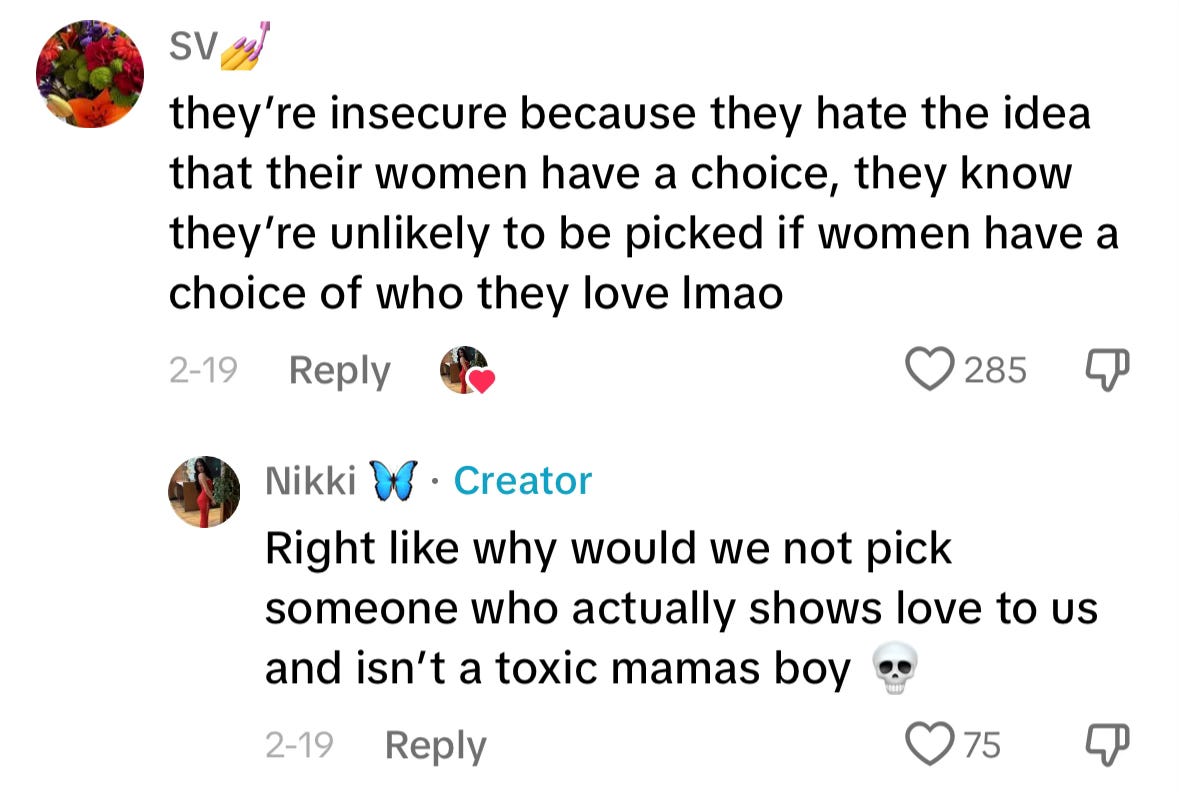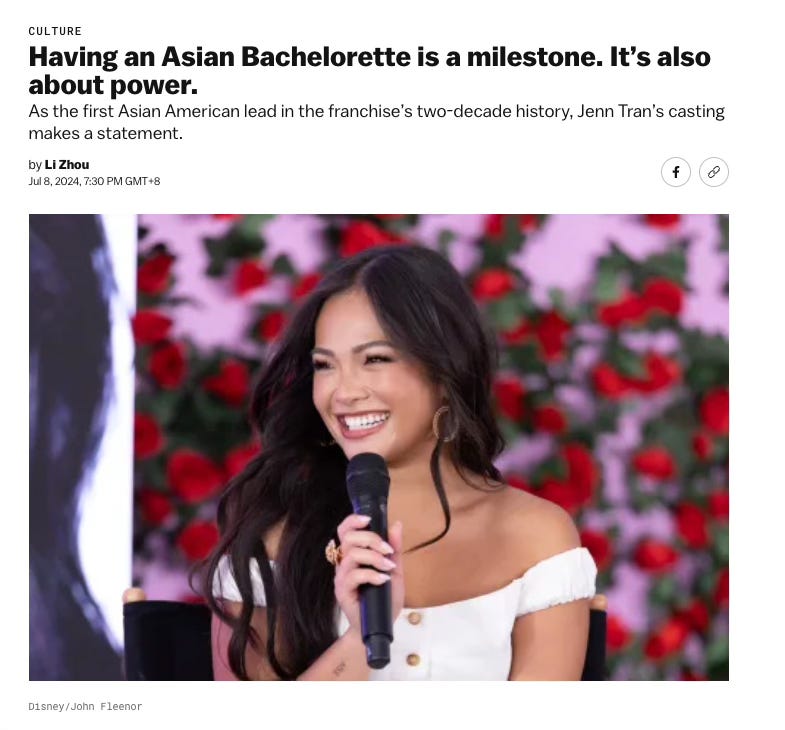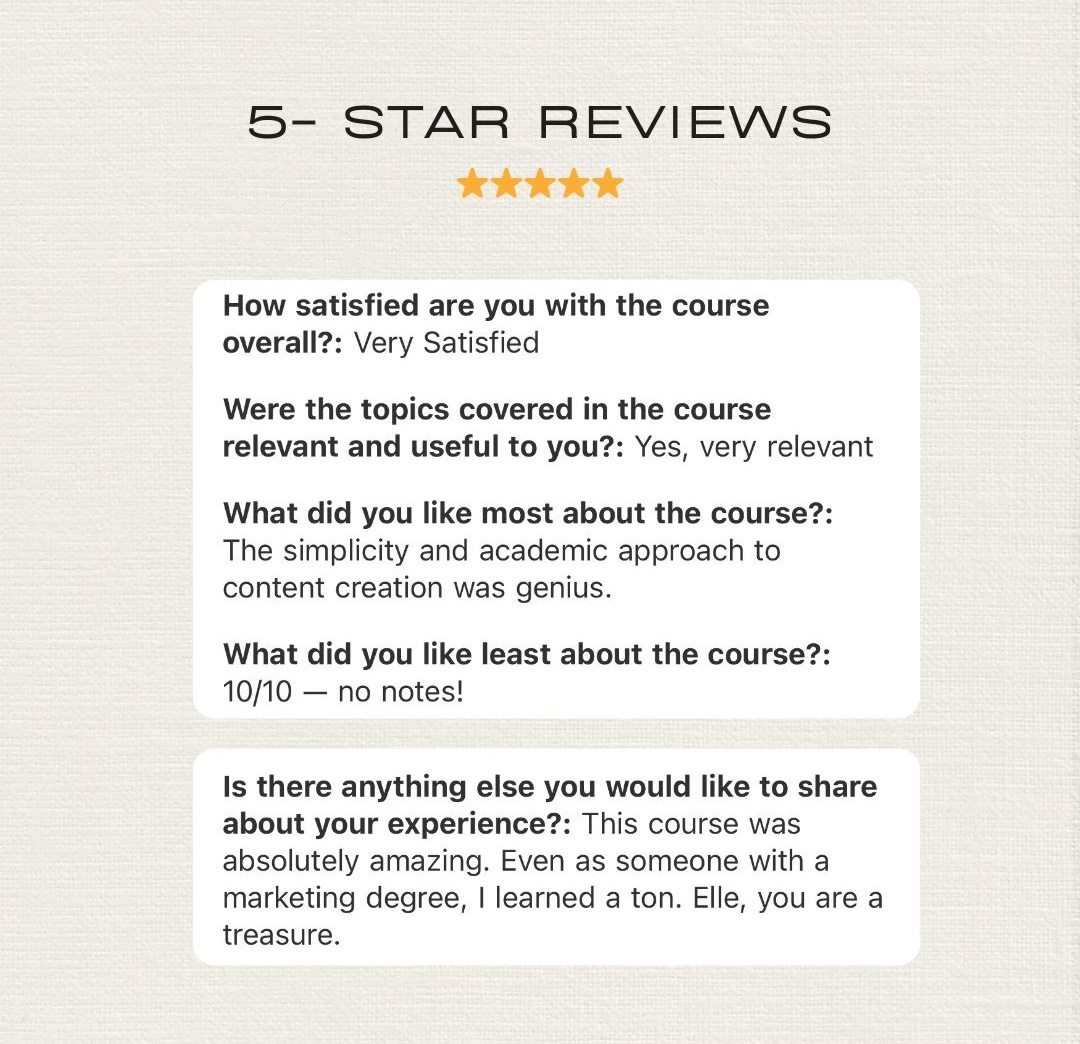…this policing of Asian women’s dating behaviors is just anti-miscegenation rhetoric repackaged for the modern day.
—Elle Ray
The digital arena has undeniably become a platform for both constructive dialogue and unfiltered criticism. Given the distance and anonymity, people have become even more emboldened to verbalize opinions they might otherwise keep to themselves. But while this further democratization of speech can open the space for much-needed discourse on divisive topics, it is not without its challenges, two of which being misinformation and cyberbullying.
Today’s newsletter is inspired by a TikTok video that I recently came across, which talks about the platform’s rampant obsession with humbling Asian girls, citing a certain “Oxford study” that can apparently be found on the comments sections of Asian women’s content.
In her video, Lingy shares:
“If you cannot separate an Asian woman from a fetish, you have a deeply rooted issue. If you cannot see a video of an Asian girl without speculating who she is dating in that video or if the person she is dating is white, you have a mental problem and the mental problem is just the Internet and the audacity that it gives people to comment this because none of this will ever be said in person.”
A shallow dive into the TikTok search bar will reveal a slew of videos of Asian woman and white man couples. And what has gotten so alarming about this whole “Oxford study” comment barrage attack towards Asian women is how vitriolic it has gotten. In fact, this female Asian experience of having her dating choices questioned and attacked has become so ubiquitous that it has earned a cameo in R.F. Kuang’s book Yellowface.
Kuang writes
“Even Athena suffered her own period of online vitriol, though in her case she really had done nothing wrong. Two years ago, she’d tweeted some uncontroversial, bleeding-heart thread about the recent rise of hate crimes against Asian Americans. I’ve never been so nervous to be in my own skin, she’d said. Until now, I never felt so much like this country was not my own. It read as a little cheesy and narcissistic, but whatever; it was a cause close to her heart, and you couldn’t exactly hate on someone who was afraid of being attacked on the street.
But then some anonymous account with an emoji of the Chinese flag in the bio asked her, If you care about Asians so much, why are you dating white?”
—R.F. Kuang, Yellowface
In 1923, the Yellowstone prequel, the season finale episode also features an unexpected couple, Dutton ranch foreman Zane (Brian Geraghty) and his wife, Alice Chow (Joy Osmanski), who are making a living in rural Montana with their two children. Later in the episode, however, local officials arrest Alice for violating the Montana statute of miscegenation.
We’ll get into anti-miscegenation laws in a bit, but I wanted to first introduce these two media examples to highlight how Asian women have been getting harassed, even arrested for their dating choices since forever. Unfortunately, this issue isn’t just some brand new TikTok-trend borne within the past year.
Interracial dating and the free marketing theory of dating
Nowadays, it’s no longer uncommon or odd to see couples of mixed racial backgrounds. But even with the pervasiveness of interracial couples both in traditional and social media, as mentioned earlier, there still exists a negative view on people, particularly women, who date outside of their race.
One popular assumption is that there must be an ulterior motive behind an interracial partnership (because god forbid that two people belonging from different races can just genuinely fall in love). For instance, a 2023 article by Gonlin and Hannon entitled “Now as a 50 year old woman, I know who I am: Older Black Women Reflecting on Dating and Marrying White Men” discusses how black men assume that black women who date white men are “social climbers.”
In a 2023 Buzzfeed article featuring different interracial couples’ experiences with introducing their significant others to their families, one interviewee shares:
"I'm mixed race: half Punjabi Indian and half white. My husband is Black. It was pretty nerve-wracking to meeting his family for the first time, but overall uneventful. We talked, and I asked a few questions, but they didn't ask me any. The chaos ensued once we got engaged. The day after our engagement, my husband’s mother called him — assuming I wouldn't be with him — and claimed I was marrying him for money. (We both work full-time, and I make more than him.) His dad said since I seemed reserved, I must be hiding something and could not be trusted. There was no effort to get to me or my culture. It was just assumed I was an untrustworthy gold-digger because I'm half white.”
Related to this assumption that people enter interracial relationships simply to “level up,” whether socially or economically, some also believe that people who date outside of their race do so because they hate themselves or reject their culture, as explained by TikTok creator Eunnuri Lee in her video. Some even go as far as to criticize people in interracial relationships for “not keeping the bloodline pure.”
And as archaic and terrible as that sounds, it’s unfortunately a reality for women across different races. In a Buzzfeed article, an Asian woman shared that her paternal aunts are so uncomfortable with the notion of dating someone outside of their race, and that it would be better if they “keep it clean.”
Michelle Williams of Destiny’s Child also shared in an interview her own experience of receiving backlash for her relationship, recalling that people were saying she was “ruining the legacy of her African bloodline.”
And what’s worse is that there seems to be hypocrisy and double standards on the men’s end in that the same rules and backward thinking don’t apply when it’s men dating outside of their race. When it’s men falling in love with people outside of their race, “love is love,” and everyone knows you can’t control who you fall in love with!
This distinction shows that the judgment received by women in interracial relationships isn’t founded on a genuine desire to preserve the bloodline. Otherwise, men would strictly uphold this rule themselves. So, the fact that they’re not means that controlling women’s dating choices is just about controlling women, full stop. It’s not some noble mission to preserve this idea of a pristine lineage anymore but rather, an attempt to limit women’s options.
And it’s giving… monopoly.
The ugly truth is that some men don’t want women dating outside of their race because the broader the dating pool is, the lower the chances are for these men to be chosen. Furthermore, if you believe that you “own” women of your race, then the idea of them not naturally selecting you is in itself unnatural and therefore should be forbidden.
Thankfully, women are intelligent enough to read between the lines, seeing the judgement for what it really is: insecurity
The pick-me-fication of Asian women
Unfortunately, this whole policing of women’s dating choices does more than just limit the pool of potential partners, but has also turned certain Asian women into “pick-me’s.” Originating on Twitter in 2016, the term “pickme” refers to “a woman who obsessively desires male approval and validation, often at the expense of other women.” This can manifest in a myriad of ways, from claiming that you have more guy than girl friends because you “can’t handle girl drama” to adopting traditionally male interests (i.e. sports, video games) not because you find them genuinely appealing but because you believe they make you appealing.
When it comes to dating, some Asian women who exclusively date Asian men fall for this pickme trap. There was this prominent female Asian creator who, I believe, missed an opportunity to establish that Asian women’s dating choices are not up for moral debate. On one of her TikTok videos, this creator received a comment about how refreshing it was that she has an Asian boyfriend because all the other female Asian content creators have white boyfriends. But instead of pointing out how inappropriate that comment was altogether, she simply explained why she’s dating an Asian man. While not an inherently bad response, I wish she had just shut down the whole conversation instead of validating her dating choice and patting herself on the back for not being a “race traitor.”
The power of arbitration of what is moral, what is right, what is virtuous in terms of what women do does not and should not rest on men. And every time we give them license to police us, we fall for the patriarchy’s divide-and-conquer strategy to maintain these power dynamics.
We need to care a lot less about what they think and a lot more about the outcomes we are creating for ourselves and the women around us. The vibe we’re going for is individuation. Not selfish individualism. Not blind collectivism.
Individuation.
✨Demure and mindful individuation✨
Class and status reproduction and propagation
Speaking of individuation, let’s talk about the demonization of Asian women whose interracial dating choices are viewed as bids for increased class and status not just for themselves but also for their children. I’m not going to lie; the fast-growing divide between the haves and have notes, the elites and non-elites, is very alarming. But finding a convenient, visible scapegoat is never the answer.
In her book The Sum of Small Things, Elizabeth Currid-Halkett highlights this concern as something we should all be aware of. She writes:
“There are not many billionaires and oil titans in the world, but the aspirational class is a big and powerful cultural formation. Most importantly, through their subtle and increasingly inconspicuous choices in how to spend, how to behave, and what to value, they shore up their and their children’s distinct sociocultural (and often economic) position of privilege, leaving everyone else out. The aspirational class members’ self-assurance with their decisions and seeming deservedness of their social position allows them to ignore the growing inequality all around them.”
—Elizabeth Currid-Halkett, The Sum of Small Things
In short, the growing class divide is real and poses real effects on everyone.
Now, there’s no research to suggest that Asian women choose to date and marry outside of their race to occupy higher status and inherit greater privileges from white men. But since those who police Asian women strongly believe this to be the case, let’s humor them for a second.
Let’s say that it is true that Asian women date and marry white men for status.
Well, so what?
Men only ever date and marry for status, so why is it bad when women take a page from their playbook and do the same thing?
Let’s be honest. We humans only ever do anything in society for status. Anyone who has ever been a part of a community acts in accordance with what they believe their community respects, honors, and values. Every choice we make is motivated by our desire to either camouflage or overplay our status. If you live in a society, if you have an internet connection, if you’re not living a hermit life in the middle of nowhere, I’m sorry to say but you are also complicit in this. We all are. By nature, we determine our standing in society by measuring ourselves against those who have more or less than us in whatever category we deem significant. It’s just what we do.
So, why is it bad when women display what is obviously very natural human behavior by making decisions that secure them a better societal standing?
With all that said, whether or not it’s true that Asian women are complicit in this growing status divide by exclusively dating higher status men in other races and cultures, why is it up to only the Asian women to fix the ills of society? Why is it that, time and time again, we point to women, specifically women of color, to fix problems we wouldn’t even have if we’d remained functioning in our collaborative matriarchal societies?
Asian women (actually, all women of color) are not scapegoats for men of color’s frustrations, for white men’s frustrations, for any man’s frustrations. These men built patriarchal, capitalistic, and hierarchical systems to oppress and monopolize women then suddenly take it out on them because they’re not winning in the systems built by them FOR THEM?
Make it make sense.
The infamous “Oxford study:” race loyalty or monopolization of women?
This is what gets me about this whole “Oxford study” comment brigade. Because the narrative that Asian women choose white men only to acquire their status and privilege reinforces the harmful notion that Asian women lack any real agency. They’re seen as merely floating in time and space until a man, whether Asian or white, claims her. Nowhere in this “Oxford study” does it take into account that maybe, just maybe, there are real and valid reasons why Asian women choose to date outside their race.
And, as we mentioned earlier, men pull the “what about race loyalty?” card just to maintain their monopolies. Men of color police women of color into dating them out of “race loyalty” to monopolize the pool, drive standards down, and ultimately oppress women with their below-bare-minimum, low-effort men propaganda.
Now, I don’t mean to say that men outside of a certain race are angels who can never do no wrong. That’s not the point. The point is that women should be allowed to choose. We should be allowed to choose partners based on shared values, regardless of whether or not those partners belong to the same race or culture as us. Because, if you’ve had your fair share of experiences in the dating world, you’d know that shared values are not actually as easily encountered. And dismissing high potential partnerships on the basis of race is a real disservice to ourselves.
Interracial dating as an “escape”
Upon researching this topic, I came upon the “hard wig, soft life” trend that has been making rounds on TikTok, with Black content creators sharing their positive experiences dating, marrying, and building families with non-Black men.
This got me thinking. Are women of color finding their happily ever after by virtue of dating and marrying white men? Or are they finding it by virtue of dating and marrying interracially — period?
For some people, dating outside of their race has more benefits than just increasing their options for partners. In cases where the culture is oppressive to women, by virtue of marrying into a different culture, the woman is less subjected to the strict application of that culture’s oppressive practices towards women.
I came across a TikTok where an Indian woman reacted to a video of a white woman praising her Indian in-laws for their hospitality and kindness, particularly that shown by her brothers-in-law’s wives who were hosting and cooking for them. The Indian woman, while not throwing shade, pointed out something significant. That the reason why the white woman wasn’t expected to follow cultural traditions is because she isn’t part of that culture herself.
On the other hand, the sisters-in-law are expected to uphold the cultural norms because they’re less likely to leave the family structure. This dynamic is rooted in the fact that those who are born into a culture are often subjected to its more oppressive aspects, while outsiders are shown more leniency simply because they have the option to leave.
By marrying into a different culture, you can escape the more oppressive elements of your own while also being less subjected to those of the new culture. This makes it even more clear that the criticism that women face for interracial dating goes beyond race. Rather, it reflects a broader effort by men to monopolize the dating scene, limit women’s choices, and protect the power they hold in maintaining cultural norms. They want to keep subjecting women to the harsh, oppressive aspects of their shared culture because they know that 1. the women expect it 2. the women are used to it, and 3. the women are less likely to leave.
The pressure on asian women to explain their dating choices and a deep dive into the “Oxford Study”
As mentioned in the earlier TikTok video, many Asian influencers have been criticized for dating and marrying white men, viewing this choice as complicity in racism.
Executive Director of the nonprofit National Asian Pacific American Women’s Forum Sung Yeon Choimorrow told NBC America:
The assumption is that an Asian woman who is married to a white man, she's living some sort of stereotype of a submissive Asian woman, who’s internalizing racism and wanting to be white or being closer to white or whatever.
I mean, what other logical explanation is there? That these women are choosing relationships wherein they feel safest or are treasured, relationships that are most conducive to bring children into, without even considering race?
That’s impossible!
Unfortunately, the belief that Asian women who date outside their race are driven by insincere or even malicious intent has fueled the rise of the so-called 'Oxford Study' phenomenon on TikTok.
Steffi Cao from The Guardian describes the phenomenon as follows:
“The phrase ‘Oxford study’ refers to just that: an academic study out of Oxford University. The research is of interest because commenters believe it explores why Asian women, like the women in these posts, date white men instead of men of color. Commenters use it to signal a rabid interest in the personal lives of Asian women, informed by entrenched stereotypes around race and gender. They cite the study as a shorthand to criticize the romantic and sexual choices of Asian women in interracial relationships. Many of these commenters are men, often Asian men, and they want to make Asian women the butt of their bad joke… When an Asian woman decides to date a white man, she knows there is a good chance she will be blamed by some Asian men for what they see as the degradation of their own dating pool. They might cast her as both a victim of white supremacy and a villain for upholding it: yet another Asian woman happy to be in the clutches of a totally ordinary white man. They probably won’t consider how her experiences dating within the Asian community have influenced her decision to date outside it.”
Over the past year, this phrase has been repeatedly used to target Asian women on social media platforms, particularly TikTok. Whether it's a vlog where an Asian woman discusses her experiences dating white men, a video of a young Asian student showing off her prom dress alongside her white boyfriend, or an Asian woman dancing with her white partner, the phrase "Oxford study" often appears in the captions or comments. And it’s crucial that we recognize these comments as not just casual remarks but ones that reflect a deeper societal issue where Asian women are scrutinized and criticized for their romantic choices, reinforcing harmful stereotypes about race and gender.
But do you want to hear a plot twist?
This study doesn’t actually exist — at least not in the way people have been led to believe. But even though the specific study isn’t real, the Oxford study comment barrage phenomenon, which shames Asian women for having or desiring white partners, is. And it’s giving modern day anti-miscegenation laws.
The history of anti-miscegenation laws and rhetoric
Anti-miscegenation laws are laws that enforce racial segregation at the level of marriage and intimate relationships by criminalizing interracial marriage. These laws were first introduced in North America from the late 17th century onwards by several of the Thirteen Colonies, and remained in force in many US states until 196. Similar laws were also enforced in Nazi Germany as part of the Nuremberg laws that were passed in 1935, as well as in South Africa as part of the system of Apartheid in 1948.
In the TV show 1923, the Asian wife gets arrested for having a white husband due to a Montana statute prohibiting race mixing. At the time, the anti-race mixing rhetoric was rooted in Sinophobia or xenophobia and other racist bases.
Jeffrey Speicher writes in his Collider article titled ‘1923’: The True Story Behind the Season 1 Finale’s Mixed-Marriage Law:
“The legislation particular to people of Chinese descent was in Section 2 of the bill and reads, "Every marriage hereafter Contracted or Solemnized between any White Person and a Chinese Person shall be utterly Null and Void." [It wasn't until President Dwight D. Eisenhower took office in 1953] and started to make some changes to the government's position on racial discrimination, along with substantial and successful anti-discrimination cases all over the country, as well as the progress of such groups as the NAACP that some traction started to take hold and trickle down to the states and eventually to the Montana.”
—Jeffrey Speicher. “'1923': The True Story Behind the Season 1 Finale's Mixed-Marriage Law.” Collider.
Speicher notes though that there were people of significant influence who lobbied for racial mixing, including Thomas Jefferson who asked Americans to “let our settlements and [Indians] meet and blend together, to intermix and become one people” during his presidency. Patrick Henry apparently even suggested tax benefits and stipends to encourage mixed-race unions. However, interracial relationships were still resisted by majority of the white settlers, particularly the British who deemed non-Europeans as inferior to them. It was only until 1967 and the Supreme Court case of Loving v. Virginia that interracial marriage became legal.
It’s fascinating how people today tend to adopt this moral high ground whenever we talk about discriminatory events in the past. We like to think that we are so much more advanced compared to these people. But these people of the past who did not believe in race mixing also felt like they had valid reasons to believe the things that they believed. They also felt like it was their moral imperative to penalize and forbid race mixing. They also justified their hatred with false, feel-good narratives that actually reek of moral narcissism.
While anti-miscegenation rhetoric and laws were fueled by racism and Sinophobia back in the old days, today, the same rhetoric is fueled by men’s misogyny and entitlement towards women. So, we need to get off our high horse because this policing of Asian women’s dating behaviors is just anti-miscegenation rhetoric repackaged for the modern day.
The historical hypersexualization of Asian women and the desexualization of Asian men
As with every topic we discuss in the spoiled girlie support group, I believe it’s always worth presenting the arguments and sentiments of the other side to have a firmer grasp on the issue. And in the case of Asian men’s anger towards Asian women dating outside their race, sociologist Nancy Wang Yuen, who specializes in Asian American media representation, points out that there is some validity to their negative response.
She suggests that the roots lie in the emasculation of Asian American men whose history dates back to the 1800s and early 1900s, which marked some of the first waves of immigration from Asia to the U.S. Because while Asian men, specifically Chinese men, were recruited to build the transcontinental railroad, Asian women were kept from entering the country because of the Page Act of 1875. Supposedly, this was to bar entry of immigrants coming to the US for “immoral purposes” i.e. prostitution. However, Page, the main politician pushing for this bill, explicitly said that it was meant to “end the danger of cheap Chinese labor and immoral Chinese women.”
Asian men were also historically barred from traditionally male occupations during this time. Furthermore, anti-miscegenation laws were also in fact. So, with Asian women not being able to enter the U.S. and Asian men not being allowed to marry people from other races as well as take on “masculine jobs,” there existed a whole bachelor society filled with different kinds of partner-less, culturally emasculated Asian men in the United States.
In short, the historical context that contributed to the emasculation of Asian men has also intersected with the hyper-sexualization of Asian women. And this hyper-sexualization of Asian women fuels Asian men’s entitlement to the former and their perception that Asian women are agent-less creatures laying their hair down for the white man they “love long time.”
This hyper-sexualization is partly due to the US military occupation in Asia including Korea, Vietnam, the Philippines, and Japan, which led to US soldiers interacting largely with Asian sex workers. It was these interactions that spawned the Hollywood depictions that further entrenched Asian women as vehicles for white male sexual gratification. Stanley Kubrick’s 1987 film Full Metal Jacket is infamous in its perpetuation of this stereotype with its scene featuring a Vietnamese sex worker exclaiming “Me so horny” to a group of U.S. soldiers. Other film and television depictions of Asian women such as Madame Butterfly, Memoirs of a Geisha, and Miss Saigon all featured Asian female characters who were “diminutive, self-sacrificing, and objectified.” Collectively, these depictions formed the most prevalent tropes assigned to Asian women: the “lotus blossom” who is submissive and eager to please, and the cunning “dragon lady” who weaponizes her sexuality.
Li Zhou writes in her Vox article:
In these depictions, Asian women are frequently robbed of their agency in the romantic relationships they’re in. They’re dependent on the choices of the men they encounter, and they’re shown as catering to them rather than centering their own needs. In Miss Saigon, for example, the Vietnamese lead waits for years for a white American soldier to return for her, and ultimately kills herself so her son is able to go to the United States.
Today, these stereotypes continue to haunt Asian women. In the eyes of some people, we’re not fully realized human beings with our own wants, needs, and interests. We’re a preference, a fetish, a cure to their disgusting “yellow fever.” Even the mass shooter in the 2021 Atlanta incident admitted to targeting an Asian parlor to “eliminate his temptations.”
So, the fetishization of Asian women and this entire narrative that Asian women are agent-less creatures isn’t just annoying; it can also be very deadly (see the 2021 Atlanta parlor shooting).
The need for greater representation of Asian women displaying agency
At this point, you’re probably wondering: what now? Are we meant to just depress ourselves by knowing all of this?
Well, I’ll be honest and say that I don’t fully well know the solution to these complex issues that have been around longer than I have been but apparently (and thankfully), change is here.
Zhou’s article sums it all up.
Of course, casting an Asian woman as the lead on a dating show won’t extinguish all of these racial and sexist issues. But hopefully, by seeing her call the shots, we can slowly flip the script on how Asian women have generally been depicted in relationships and ultimately push back against past stereotypes.
No, we’re not hyper-sexual creatures. No, we’re not agent-less creatures.
No, we absolutely will not love you long time.
People need to realize that attacking Asian women or any group of women for dating outside their race is misdirected anger, one that stems from insecurities and societal pressures. Because when “people” lack self-awareness on the roots of their harmful perceptions, they blame the one immutable unchangeable thing about them instead of finding ways to improve their lot (i.e. Asian men blaming their being Asian instead of other unattractive characteristics such as lack of self awareness and their misogynistic beliefs and actions towards women).
By focusing on reclaiming and redefining their masculinity in ways that align with their own cultural values and personal aspirations, Asian men can find fulfillment and self-worth that is independent of others’ choices. The desexualization and emasculation of Asian men is not Asian women’s fault, so why does the onus of resolving decades and centuries of racist messaging rest on Asian women?
As Astrid said in Crazy Rich Asians, “it’s not my job to make you feel like a man.”
A woman’s choice in a partner, actually anyone’s choice in a partner, is simply informed by compatibility and mutual attraction built on shared interests, similar lifestyles, and, perhaps to some degree, the subconscious human drive to reproduce status.
Asian men are not entitled to Asian women
Men of color are not entitled to women of color
Men are not entitled to women. Period.
A grown woman making choices on who to date should be no one’s business but hers.
As Zhou writes in Vox,
As Bachelorette, Tran will make decisions that reflect her own interests and preferences. She’ll determine who gets time with her, who gets sent home, and who could ultimately be a serious partner outside the show. Since she’s the star, the show is set to be oriented around her story — and not anyone else’s.
At the end of the day, we’re all just writing our own stories and who we cast as important characters in ours is our decision alone.
So, bestie, wake up.
✨the classifieds✨
want to be a full-time creator girlie?
I made a STEP-BY-STEP, no gatekeeping, bare-it-all tell-all here:
The Business of Content Creation.
Forget the guesswork. I've distilled every lesson, every strategy, and every shortcut into this comprehensive course. From nailing down your content strategy to mastering algorithm analysis (because the algorithm always changes. you can’t learn “the algorithm” but you can learn to analyze her"), I leave no stone unturned. LITERALLY.
I cover everything from my research strategy to how to edit your first video to how to hire, manage, and motivate a team (plus how to afford one).
But don't just take my word for it.
The girlies are already raving about the program.
Use the code: CREATOR100 to get $100 off
I can't wait to see you thrive as a content creator girlie 🥰
Now get that bag, bestie!
-Elle.

